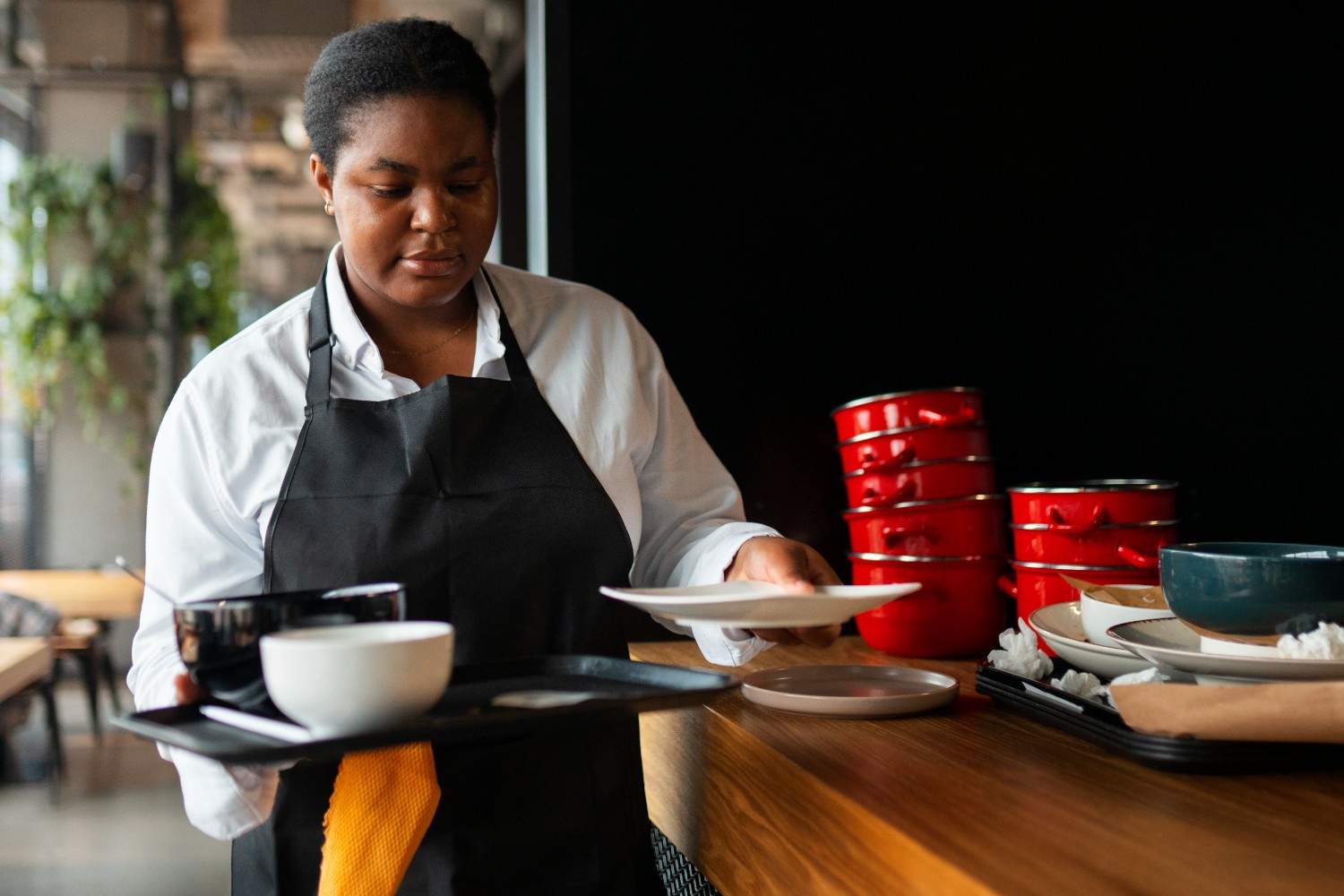Canada has emerged as one of the most attractive destinations for international workers seeking stable employment, quality of life, and career advancement. Among the many industries offering opportunities, the hospitality and food service sector—particularly restaurants—stands out as one of the fastest-growing employers. With labor shortages across provinces and a thriving multicultural dining scene, there is an increasing demand for skilled and semi-skilled workers in restaurants.
For global applicants, restaurant jobs in Canada with visa sponsorship in 2025 provide not only steady employment but also a pathway to long-term residency and career development. Whether you are an experienced chef, a kitchen assistant, or someone passionate about customer service, Canada’s restaurant industry offers opportunities across various roles and regions.
This article explores the state of restaurant jobs in Canada, the positions available, visa sponsorship opportunities, salaries, qualifications, and how international workers can take advantage of this growing demand in 2025.
Why Restaurant Jobs Are in High Demand in Canada
Labor Shortages in the Hospitality Sector
The Canadian restaurant industry has faced workforce shortages for years. Retirement of older workers, rapid industry growth, and the impact of global events have made it challenging for employers to fill positions. This shortage has led restaurants across provinces to sponsor international applicants to meet staffing needs.
Canada’s Growing Dining Industry
With a diverse population and millions of international tourists visiting every year, Canada’s restaurant industry is expanding. From fine dining establishments in major cities to family-run diners in rural areas, demand for restaurant workers continues to rise.
Immigration-Friendly Policies
Canada actively encourages immigration to address labor gaps. The federal and provincial governments support visa sponsorship for restaurant jobs, particularly under programs that recognize food service workers as essential to the economy.
Types of Restaurant Jobs Available in Canada
The restaurant industry in Canada is broad, offering opportunities across different levels of skill and experience.
Kitchen Roles
- Chefs and Cooks – preparing meals, developing menus, and managing kitchen operations.
- Sous Chefs – assisting head chefs in supervision and food preparation.
- Line Cooks – handling specific stations such as grilling, frying, or baking.
- Prep Cooks – preparing ingredients and supporting the main cooking process.
- Dishwashers – ensuring kitchen cleanliness and hygiene.
Front-of-House Positions
- Servers and Waitstaff – taking orders, serving meals, and ensuring customer satisfaction.
- Hosts/Hostesses – welcoming guests and managing seating arrangements.
- Bartenders – mixing and serving beverages.
- Cashiers – managing billing and payment transactions.
Management and Supervisory Roles
- Restaurant Managers – overseeing day-to-day operations, staff management, and budgets.
- Assistant Managers – supporting overall restaurant management tasks.
- Shift Supervisors – monitoring staff performance during shifts.
Specialized Roles
- Pastry Chefs – specializing in desserts and baked goods.
- Baristas – preparing coffee and beverages in cafés and restaurants.
- Catering Staff – managing off-site restaurant services for events.
Visa Sponsorship Opportunities for Restaurant Jobs in Canada
International applicants can secure work in Canadian restaurants through various visa sponsorship pathways.
Temporary Foreign Worker Program (TFWP)
Under the TFWP, Canadian employers can hire foreign workers for restaurant positions when no local candidates are available. Employers must obtain a Labour Market Impact Assessment (LMIA), which shows the need for foreign workers.
Provincial Nominee Programs (PNPs)
Several provinces offer PNP streams targeting restaurant and food service workers. These programs allow workers to obtain permanent residency while working in sponsored roles.
Express Entry Pathways
Although traditionally for skilled workers, candidates with Canadian restaurant work experience can qualify for permanent residency through Express Entry programs such as the Canadian Experience Class.
Rural and Atlantic Immigration Programs
Restaurants in rural areas or Atlantic provinces (Newfoundland, New Brunswick, Nova Scotia, and Prince Edward Island) often sponsor foreign workers due to critical labor shortages.
Salary Expectations for Restaurant Jobs in Canada
Salaries in Canada’s restaurant industry vary based on role, experience, and location.
- Dishwashers and Kitchen Helpers – CAD $28,000 to $35,000 annually.
- Line Cooks and Prep Cooks – CAD $32,000 to $42,000 annually.
- Chefs and Sous Chefs – CAD $45,000 to $65,000 annually.
- Restaurant Managers – CAD $50,000 to $75,000 annually.
- Servers and Bartenders – CAD $25,000 to $40,000 annually (tips often increase earnings).
- Specialized Chefs (Pastry, Sushi, etc.) – CAD $50,000 to $80,000 annually.
Many employers offering visa sponsorship also include relocation support, accommodation, and overtime pay.
Benefits of Restaurant Jobs in Canada with Sponsorship
- Secure Employment – Sponsorship provides legal authorization to work.
- Competitive Pay – Restaurant workers in Canada earn higher wages compared to many other countries.
- Career Development – Opportunities for training, promotion, and culinary specialization.
- Permanent Residency Pathways – Many visa sponsorships lead to long-term settlement in Canada.
- Cultural Diversity – Canada’s multicultural environment provides a unique working experience.
- Comprehensive Benefits – Sponsored employees may receive healthcare, housing, and pension plans.
Skills and Qualifications Employers Look For
International applicants must demonstrate the following qualities to succeed in securing restaurant jobs in Canada:
- Experience – Prior work in kitchens, customer service, or restaurant operations.
- Education – Culinary degrees or food service training can be an advantage.
- English or French Proficiency – Strong communication is vital for customer interaction.
- Teamwork and Adaptability – Restaurants require collaboration and flexibility.
- Certifications – Food safety and handling certifications (can often be completed in Canada).
- Customer Service Skills – Positive attitude and ability to handle fast-paced environments.
Regions in Canada with High Demand for Restaurant Workers
Ontario
Toronto and Ottawa have strong demand due to tourism, multicultural dining, and population growth.
British Columbia
Vancouver and surrounding areas require workers in fine dining, casual restaurants, and resort towns.
Alberta
Cities like Calgary and Edmonton need chefs, cooks, and service staff in both urban and rural areas.
Atlantic Canada
Due to shortages, restaurants in Nova Scotia, New Brunswick, and Newfoundland actively sponsor international workers.
Prairie Provinces
Saskatchewan and Manitoba face growing demand in both fast-food and family-owned restaurants.
Challenges for International Workers
While restaurant jobs in Canada offer many opportunities, there are challenges:
- Visa Processing Delays – Paperwork for sponsorship can take time.
- Competition – Popular cities attract many applicants.
- High Living Costs – Larger cities like Toronto and Vancouver can be expensive.
- Cultural Adjustment – Adapting to Canadian workplace culture and customer service standards.
- Shift Work – Restaurants often require evening, weekend, and holiday shifts.
Steps to Secure Restaurant Jobs in Canada with Visa Sponsorship
- Identify High-Demand Roles – Focus on chefs, cooks, and supervisors where shortages are greatest.
- Research Sponsoring Employers – Target restaurants or chains that are approved to hire foreign workers.
- Prepare Professional Applications – Highlight experience, certifications, and adaptability.
- Complete Language Requirements – Strong English or French proficiency boosts chances.
- Be Open to Locations – Consider rural or Atlantic provinces where sponsorship is more common.
- Understand Visa Pathways – Familiarize yourself with LMIA, PNP, and Express Entry processes.
Future Outlook for Restaurant Jobs in Canada (2025 and Beyond)
The demand for restaurant workers in Canada will remain strong due to:
- Population Growth – Immigration and urban expansion increase dining demand.
- Tourism Recovery – Rising numbers of tourists will boost restaurant hiring.
- Industry Growth – Expansion of international restaurant chains and fine dining.
- Labor Shortages – Employers will continue to rely on global applicants to fill critical roles.
- Sustainability Focus – Growth of eco-friendly restaurants and farm-to-table concepts.
For international applicants, 2025 represents one of the best times to explore Canadian restaurant careers with sponsorship support.
Tips for Success in Canada’s Restaurant Industry
- Obtain Food Safety Certification – Employers value staff trained in hygiene and safety.
- Be Flexible with Shifts – Willingness to work evenings and weekends improves hiring chances.
- Learn Cultural Etiquette – Understanding Canadian service standards is crucial.
- Build Long-Term Goals – Use restaurant jobs as a pathway to permanent residency and career growth.
- Stay Adaptable – Embrace different cuisines, cultures, and customer expectations.
Conclusion
Restaurant jobs in Canada with visa sponsorship in 2025 represent a golden opportunity for international applicants seeking stable employment, immigration pathways, and rewarding careers. With labor shortages across provinces, employers are increasingly open to sponsoring skilled and semi-skilled workers for positions ranging from kitchen staff to restaurant managers.
For global professionals, the combination of competitive salaries, relocation benefits, cultural diversity, and pathways to permanent residency makes Canada an attractive destination. Success lies in building relevant skills, targeting sponsoring employers, and staying flexible in terms of location and job type.
As Canada’s restaurant industry continues to expand, international workers have the chance not only to secure meaningful jobs but also to build a long-term future in one of the most welcoming and multicultural countries in the world.









